Healthy eating interventions delivered in early childhood education and care settings for improving the diet of children aged six months to six years
- PMID: 37306513
- PMCID: PMC10259732
- DOI: 10.1002/14651858.CD013862.pub2
Healthy eating interventions delivered in early childhood education and care settings for improving the diet of children aged six months to six years
Update in
-
Healthy eating interventions delivered in early childhood education and care settings for improving the diet of children aged six months to six years.Cochrane Database Syst Rev. 2023 Aug 22;8(8):CD013862. doi: 10.1002/14651858.CD013862.pub3. Cochrane Database Syst Rev. 2023. PMID: 37606067 Free PMC article.
Abstract
Background: Dietary intake during early childhood can have implications on child health and developmental trajectories. Early childhood education and care (ECEC) services are recommended settings to deliver healthy eating interventions as they provide access to many children during this important period. Healthy eating interventions delivered in ECEC settings can include strategies targeting the curriculum (e.g. nutrition education), ethos and environment (e.g. menu modification) and partnerships (e.g. workshops for families). Despite guidelines supporting the delivery of healthy eating interventions in this setting, little is known about their impact on child health.
Objectives: To assess the effectiveness of healthy eating interventions delivered in ECEC settings for improving dietary intake in children aged six months to six years, relative to usual care, no intervention or an alternative, non-dietary intervention. Secondary objectives were to assess the impact of ECEC-based healthy eating interventions on physical outcomes (e.g. child body mass index (BMI), weight, waist circumference), language and cognitive outcomes, social/emotional and quality-of-life outcomes. We also report on cost and adverse consequences of ECEC-based healthy eating interventions.
Search methods: We searched eight electronic databases including CENTRAL, MEDLINE, Embase, CINAHL, PsycINFO, ERIC, Scopus and SportDiscus on 24 February 2022. We searched reference lists of included studies, reference lists of relevant systematic reviews, the World Health Organization International Clinical Trials Registry Platform, ClinicalTrials.gov and Google Scholar, and contacted authors of relevant papers.
Selection criteria: We included randomised controlled trials (RCTs), including cluster-RCTs, stepped-wedge RCTs, factorial RCTs, multiple baseline RCTs and randomised cross-over trials, of healthy eating interventions targeting children aged six months to six years that were conducted within the ECEC setting. ECEC settings included preschools, nurseries, kindergartens, long day care and family day care. To be included, studies had to include at least one intervention component targeting child diet within the ECEC setting and measure child dietary or physical outcomes, or both.
Data collection and analysis: Pairs of review authors independently screened titles and abstracts and extracted study data. We assessed risk of bias for all studies against 12 criteria within RoB 1, which allows for consideration of how selection, performance, attrition, publication and reporting biases impact outcomes. We resolved discrepancies via consensus or by consulting a third review author. Where we identified studies with suitable data and homogeneity, we performed meta-analyses using a random-effects model; otherwise, we described findings using vote-counting approaches and via harvest plots. For measures with similar metrics, we calculated mean differences (MDs) for continuous outcomes and risk ratios (RRs) for dichotomous outcomes. We calculated standardised mean differences (SMDs) for primary and secondary outcomes where studies used different measures. We applied GRADE to assess certainty of evidence for dietary, cost and adverse outcomes. MAIN RESULTS: We included 52 studies that investigated 58 interventions (described across 96 articles). All studies were cluster-RCTs. Twenty-nine studies were large (≥ 400 participants) and 23 were small (< 400 participants). Of the 58 interventions, 43 targeted curriculum, 56 targeted ethos and environment, and 50 targeted partnerships. Thirty-eight interventions incorporated all three components. For the primary outcomes (dietary outcomes), we assessed 19 studies as overall high risk of bias, with performance and detection bias being most commonly judged as high risk of bias. ECEC-based healthy eating interventions versus usual practice or no intervention may have a positive effect on child diet quality (SMD 0.34, 95% confidence interval (CI) 0.04 to 0.65; P = 0.03, I2 = 91%; 6 studies, 1973 children) but the evidence is very uncertain. There is moderate-certainty evidence that ECEC-based healthy eating interventions likely increase children's consumption of fruit (SMD 0.11, 95% CI 0.04 to 0.18; P < 0.01, I2 = 0%; 11 studies, 2901 children). The evidence is very uncertain about the effect of ECEC-based healthy eating interventions on children's consumption of vegetables (SMD 0.12, 95% CI -0.01 to 0.25; P =0.08, I2 = 70%; 13 studies, 3335 children). There is moderate-certainty evidence that ECEC-based healthy eating interventions likely result in little to no difference in children's consumption of non-core (i.e. less healthy/discretionary) foods (SMD -0.05, 95% CI -0.17 to 0.08; P = 0.48, I2 = 16%; 7 studies, 1369 children) or consumption of sugar-sweetened beverages (SMD -0.10, 95% CI -0.34 to 0.14; P = 0.41, I2 = 45%; 3 studies, 522 children). Thirty-six studies measured BMI, BMI z-score, weight, overweight and obesity, or waist circumference, or a combination of some or all of these. ECEC-based healthy eating interventions may result in little to no difference in child BMI (MD -0.08, 95% CI -0.23 to 0.07; P = 0.30, I2 = 65%; 15 studies, 3932 children) or in child BMI z-score (MD -0.03, 95% CI -0.09 to 0.03; P = 0.36, I2 = 0%; 17 studies; 4766 children). ECEC-based healthy eating interventions may decrease child weight (MD -0.23, 95% CI -0.49 to 0.03; P = 0.09, I2 = 0%; 9 studies, 2071 children) and risk of overweight and obesity (RR 0.81, 95% CI 0.65 to 1.01; P = 0.07, I2 = 0%; 5 studies, 1070 children). ECEC-based healthy eating interventions may be cost-effective but the evidence is very uncertain (6 studies). ECEC-based healthy eating interventions may have little to no effect on adverse consequences but the evidence is very uncertain (3 studies). Few studies measured language and cognitive skills (n = 2), social/emotional outcomes (n = 2) and quality of life (n = 3).
Authors' conclusions: ECEC-based healthy eating interventions may improve child diet quality slightly, but the evidence is very uncertain, and likely increase child fruit consumption slightly. There is uncertainty about the effect of ECEC-based healthy eating interventions on vegetable consumption. ECEC-based healthy eating interventions may result in little to no difference in child consumption of non-core foods and sugar-sweetened beverages. Healthy eating interventions could have favourable effects on child weight and risk of overweight and obesity, although there was little to no difference in BMI and BMI z-scores. Future studies exploring the impact of specific intervention components, and describing cost-effectiveness and adverse outcomes are needed to better understand how to maximise the impact of ECEC-based healthy eating interventions.
Copyright © 2023 The Cochrane Collaboration. Published by John Wiley & Sons, Ltd.
Conflict of interest statement
Sze Lin Yoong: is currently undertaking primary research that may be relevant to the review. Where we included such a study, other authors who were not directly involved in the study completed screening, data extraction and 'risk of bias assessments. This author has not received any benefit, in cash or kind, any hospitality, or any subsidy derived from any source perceived to have an interest in the outcome of the review.
Melanie Lum: declares no conflict of interest.
Jacklyn Jackson: declares no conflict of interest.
Luke Wolfenden: is currently undertaking primary research that may be relevant to the review. Where we included such a study, other authors who were not directly involved in the study completed screening, data extraction and risk of bias assessments. This author has not received any benefit, in cash or kind, any hospitality, or any subsidy derived from any source perceived to have an interest in the outcome of the review. Luke Wolfenden is Co‐ordinating Editor of Cochrane Public Health and was not involved in any stage of the editorial management or assessment of this review.
Courtney Barnes: is currently undertaking primary research that may be relevant to the review. Where we included such a study, other authors who were not directly involved in the study completed screening, data extraction and risk of bias assessments. This author has not received any benefit, in cash or kind, any hospitality, or any subsidy derived from any source perceived to have an interest in the outcome of the review.
Alix E Hall: is a Methods Editor for Cochrane Public Health and was not involved in any stage of the editorial management or assessment of this review.
Sam McCrabb: is Assistant Managing Editor and Methods Editor and was not involved in any stage of the editorial management or assessment of this review.
Nicole Pearson: is currently undertaking primary research that may be relevant to the review. Where we included such a study, other authors who were not directly involved in the study completed screening, data extraction and risk of bias assessments. This author has not received any benefit, in cash or kind, any hospitality, or any subsidy derived from any source perceived to have an interest in the outcome of the review.
Cassandra Lane: declares no conflict of interest.
Jannah Z Jones: is currently undertaking primary research that may be relevant to the review. Where we included such a study, other authors who were not directly involved in the study completed screening, data extraction and risk of bias assessments. This author has not received any benefit, in cash or kind, any hospitality, or any subsidy derived from any source perceived to have an interest in the outcome of the review.
Lauren Dinour: declares no conflict of interest.
Therese McDonnell: declares no conflict of interest.
Debbie Booth: declares no conflict of interest.
Alice Grady: is currently undertaking primary research that may be relevant to the review. Where we included such a study, other authors who were not directly involved in the study completed screening, data extraction and risk of bias assessments. This author has not received any benefit, in cash or kind, any hospitality, or any subsidy derived from any source perceived to have an interest in the outcome of the review.
Figures
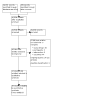
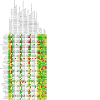
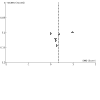
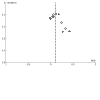
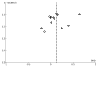
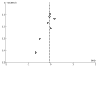
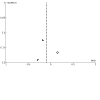
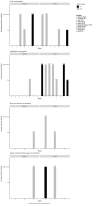
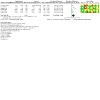
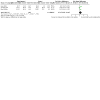
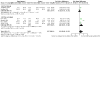
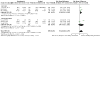
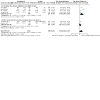
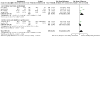
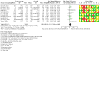
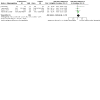
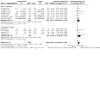
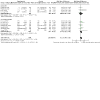
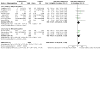
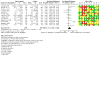
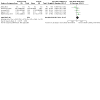
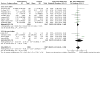
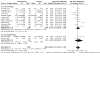
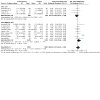
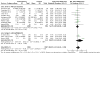
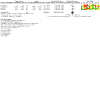
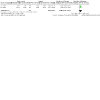
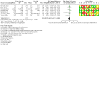
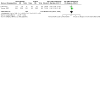
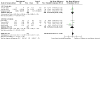
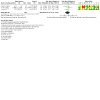
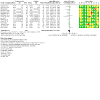
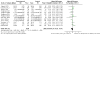
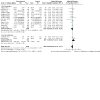
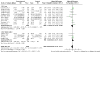
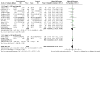
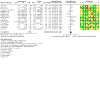
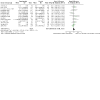
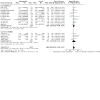
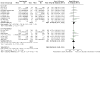
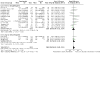
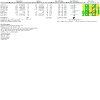
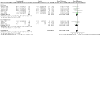
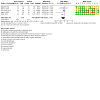
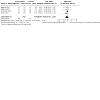
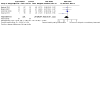
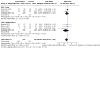
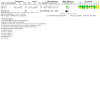
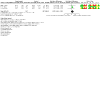
Similar articles
-
Healthy eating interventions delivered in early childhood education and care settings for improving the diet of children aged six months to six years.Cochrane Database Syst Rev. 2023 Aug 22;8(8):CD013862. doi: 10.1002/14651858.CD013862.pub3. Cochrane Database Syst Rev. 2023. PMID: 37606067 Free PMC article.
-
Strategies to improve the implementation of healthy eating, physical activity and obesity prevention policies, practices or programmes within childcare services.Cochrane Database Syst Rev. 2020 Feb 10;2(2):CD011779. doi: 10.1002/14651858.CD011779.pub3. Cochrane Database Syst Rev. 2020. PMID: 32036618 Free PMC article.
-
Interventions for increasing fruit and vegetable consumption in children aged five years and under.Cochrane Database Syst Rev. 2019 Nov 7;2019(11):CD008552. doi: 10.1002/14651858.CD008552.pub6. Cochrane Database Syst Rev. 2019. Update in: Cochrane Database Syst Rev. 2020 May 25;5:CD008552. doi: 10.1002/14651858.CD008552.pub7. PMID: 31697869 Free PMC article. Updated.
-
Interventions for increasing fruit and vegetable consumption in children aged five years and under.Cochrane Database Syst Rev. 2020 May 25;5(5):CD008552. doi: 10.1002/14651858.CD008552.pub7. Cochrane Database Syst Rev. 2020. Update in: Cochrane Database Syst Rev. 2024 Sep 23;9:CD008552. doi: 10.1002/14651858.CD008552.pub8. PMID: 32449203 Free PMC article. Updated.
-
Caregiver involvement in interventions for improving children's dietary intake and physical activity behaviors.Cochrane Database Syst Rev. 2020 Jan 5;1(1):CD012547. doi: 10.1002/14651858.CD012547.pub2. Cochrane Database Syst Rev. 2020. PMID: 31902132 Free PMC article.
Cited by
-
"I'm not sure whether I will implement it": exploring barriers and facilitators to implementing a digital "healthy eating" resource in early education and care settings - teachers' perspectives.BMC Public Health. 2024 Jun 5;24(1):1499. doi: 10.1186/s12889-024-19014-7. BMC Public Health. 2024. PMID: 38835020 Free PMC article.
-
A protocol of a pilot randomised trial (Action-RESPOND) to support rural and regional communities with implementing community-based systems thinking obesity prevention initiatives.PLoS One. 2024 May 2;19(5):e0302047. doi: 10.1371/journal.pone.0302047. eCollection 2024. PLoS One. 2024. PMID: 38696541 Free PMC article.
-
Improving Children's Lifestyle and Quality of Life through Synchronous Online Education: The Nutritional Adventures School-Based Program.Nutrients. 2023 Dec 16;15(24):5124. doi: 10.3390/nu15245124. Nutrients. 2023. PMID: 38140383 Free PMC article. Clinical Trial.
-
The Effectiveness of Strategies to Improve User Engagement With Digital Health Interventions Targeting Nutrition, Physical Activity, and Overweight and Obesity: Systematic Review and Meta-Analysis.J Med Internet Res. 2023 Dec 19;25:e47987. doi: 10.2196/47987. J Med Internet Res. 2023. PMID: 38113062 Free PMC article.
-
Integrated Measure of PRogram Element SuStainability in Childcare Settings (IMPRESS-C): development and psychometric evaluation of a measure of sustainability determinants in the early childhood education and care setting.Implement Sci. 2024 Jun 20;19(1):41. doi: 10.1186/s13012-024-01372-w. Implement Sci. 2024. PMID: 38902763 Free PMC article.
References
References to studies included in this review
Alkon 2014 {published data only}
Başkale 2011 {published data only}
Blomkvist 2021 {published data only}
-
- Blomkvist E, Wills A, Helland S, Hillesund E, Øverby N. Effectiveness of a kindergarten-based intervention to increase vegetable intake and reduce food neophobia amongst 1-year-old children: a cluster randomised controlled trial. Food & Nutrition Research 2021;65:7679. [DOI: 10.29219/fnr.v65.7679] - DOI - PMC - PubMed
Céspedes 2013 {published data only}
Davis 2016 {published data only}
-
- Davis SM, Myers OB, Cruz TH, Morshed AB, Canaca GF, Keane PC, O'Donald ER. CHILE: Outcomes of a group randomized controlled trial of an interventionto prevent obesity in preschool Hispanic and American Indian children. Preventive Medicine 2016;89:162-8. [DOI: 10.1016/j.ypmed.2016.05.018] - DOI - PMC - PubMed
De Bock 2011 {published data only}
De Coen 2012 {published data only}
-
- De Coen V, De Bourdeaudhuij I, Vereecken C, Verbestel V, Haerens L, Huybrechts I, et al. Effects of a 2-year healthy eating and physical activity intervention for 3–6-year-olds in communities of high and low socio-economic status: the POP (Prevention of Overweight among Pre-school and school children) project. Public Health Nutrition 2012;15(9):1737-45. [DOI: 10.1017/S1368980012000687] - DOI - PubMed
Eliakim 2007 {published data only}
Fernandez‐Jimenez 2019 {published data only}
-
- Bansilal S, Vedanthan R, Kovacic J, Soto A, Latina J, Björkegren J, et al. Rationale and design of family-based approach in a minority community integrating systems-biology for promotion of health (FAMILIA). American Heart Journal 2017;187:170-81. [DOI: 10.1016/j.ahj.2017.02.020] - DOI - PMC - PubMed
Fitzgibbon 2005 {published data only}
-
- Fitzgibbon M, Stolley M, Schiffer L, Van Horn L, KauferChristoffel K, Dyer A. Two-year follow-up results for Hip-Hop to Health Jr.: a randomized controlled trial for overweight prevention in preschool minority children. Journal of Pediatrics 2005;146(5):618-25. [DOI: 10.1016/j.jpeds.2004.12.019] - DOI - PubMed
Fitzgibbon 2006 {published data only}
Fitzgibbon 2011 {published data only}
Fitzgibbon 2013 {published data only}
Gans 2022 {published data only}
-
- Gans K, Tovar A, Kang A, Ward D, Stowers K, Ash T, et al. A multi‑component tailored intervention in family childcare homes improves diet quality and sedentary behavior of preschool children compared to an attention control: results from the Healthy Start‑Comienzos Sanos cluster randomized trial. International Journal of Behavioral Nutrition and Physical Activity 2022;19:45. [DOI: 10.1186/s12966-022-01272-6] - DOI - PMC - PubMed
-
- Risica P, Tovar A, Palomo V, Dionne L, Mena N, Magid K, et al. Improving nutrition and physical activity environments of family child care homes:the rationale, design and study protocol of the ‘Healthy Start/Comienzos Sanos’ cluster randomized trial. BMC Public Health 2019;19(1):419. [DOI: 10.1186/s12889-019-6704-6] - DOI - PMC - PubMed
Grummon 2019 {published data only}
Hodgkinson 2019 {published data only}
Hu 2009 {published data only}
Iaia 2017 {published data only}
Jones 2015 {published data only}
-
- Jones J, Wolfenden L, Wyse R, Finch M, Yoong S, Dodds P, et al. A randomised controlled trial of an intervention to facilitate the implementation of healthy eating and physical activity policies and practices in childcare services. BMJ Open 2014;4:e005312. [DOI: 10.1136/bmjopen-2014-005312] - DOI - PMC - PubMed
-
- Jones J, Wyse R, Finch M, Lecathelinais C, Wiggers J, Marshall J, et al. Effectiveness of an intervention to facilitate the implementation of healthy eating and physical activity policies and practices in childcare services: a randomised controlled trial. Implementation Science 2015;10(1):15. [DOI: 10.1186/s13012-015-0340-z] - DOI - PMC - PubMed
Kipping 2019 {published data only}
-
- Kipping R, Jago R, Metcalfe C, White J, Papadaki A, Campbell R, et al. NAP SACC UK: protocol for a feasibility cluster randomised controlled trial in nurseries and at home to increase physical activity and healthy eating in children aged 2–4 years. BMJ Open 2016;6:e010622. [DOI: 10.1136/bmjopen-2015-010622] - DOI - PMC - PubMed
Kobel 2019 {published data only}
Kornilaki 2021 {published data only}
-
- Kornilaki E, Skouteris H, Morris H. Developing connections between healthy living and environmental sustainability concepts in Cretan preschool children: a randomized trial. Early Childhood Development and Care 2021;1:1-14. [DOI: 10.1080/03004430.2021.1925664] - DOI
Kristiansen 2019 {published data only}
-
- Kristiansen A, Bjelland M, Himberg-Sundet A, Lien N, Holst R, Andersen L. Effects of a cluster randomized controlled kindergarten-based intervention trial on vegetable consumption among Norwegian 3–5-year-olds: the BRA-study. BMC Public Health 2019;19(1):1098. [DOI: 10.1186/s12889-019-7436-3] - DOI - PMC - PubMed
-
- Kristiansen A, Medin A, Bjelland M, Himberg‑Sundet A, Lien N, Holst R, et al. Long-term effects of a cluster randomized controlled kindergarten-based intervention trial on vegetable intake among Norwegian 3–5-year-olds: the BRA-study. BMC Research 2020;13(30):5. [DOI: 10.1186/s13104-020-4892-x] - DOI - PMC - PubMed
Leis 2020 {published data only}
-
- Bélanger M, Humbert L, Vatanparast H, Ward S, Muhajarine N, Chow A, et al. A multilevel intervention to increase physical activity and improve healthy eating and physical literacy among young children (ages 3-5) attending early childcare centres: the Healthy Start-Départ Santé cluster randomised controlled trial study protocol. BMC Public Health volume 2016;16:313. [DOI: 10.1186/s12889-016-2973-5] - DOI - PMC - PubMed
-
- Leis A, Ward S, Vatanparast H, Humbert M, Chow A, Muhajarine N, et al. Effectiveness of the Healthy Start-Départ Santé approach on physical activity, healthy eating and fundamental movement skills of preschoolers attending childcare centres: a randomized controlled trial. BMC Public Health 2020;20:523. [DOI: 10.1186/s12889-020-08621-9] - DOI - PMC - PubMed
-
- Sari N, Muhajarine N, Chow A. The Saskatchewan/New Brunswick Healthy Start-Départ Santé intervention: implementation cost estimates of a physical activity and healthy eating intervention in early learning centers. BMC Health Services Research 2017;17:57. [DOI: 10.1186/s12913-017-1978-9] - DOI - PMC - PubMed
Lerner‐Geva 2014 {published data only}
-
- Lerner-Geva L, Bar-Zvi E, Levitan G, Boyko V, Reichman B, Pinhas-Hamiel O. An intervention for improving the lifestyle habits of kindergarten children in Israel: a cluster-randomised controlled trial investigation. Public Health Nutrition 2015;18(9):1537-44. [DOI: 10.1017/S136898001400024X] - DOI - PMC - PubMed
Lumeng 2017 {published data only}
Morris 2018 {published data only}
-
- Morris H, Edwards S, Cutter-Mackenzie A, Rutherford L, Williams-Smith J, Skouteris H. Evaluating the impact of teacher-designed, wellbeing and sustainability play-based learning experiences on young children's knowledge connections: a randomised trial. Australasian Journal of Early Childhood 2018;43(4):33-42. [DOI: 10.23965/AJEC.43.4.04] - DOI
Namenek Brouwer 2013 {published data only}
Natale 2014a {published data only}
Natale 2014b {published data only}
-
- McCollister K, Tolbert D, Mishra S, Natale R, Uhlhorn S, Messiah S. Cost analysis of a childcare center-based intervention to prevent obesity in the preschool years. Journal of Comprehensive Pediatrics 2015;6(2):e25845. [DOI: 10.17795/compreped-25845] - DOI
-
- Natale R, Messiah S, Asfour L, Uhlhorn S, Delamater A, Arheart K. Role modeling as an early childhood obesity prevention strategy: effect of parents and teachers on preschool children's healthy lifestyle habits. Journal of Developmental & Behavioral Pediatrics 2014;35(6):378-87. [DOI: 10.1097/DBP.0000000000000074] - DOI - PubMed
Natale 2021 {published data only}
-
- Messiah S, Lebron C, Moise R, Mathew R, Sardinas K, Chang C, et al. Healthy caregivers-healthy children (HC2) phase 2: integrating culturally sensitive childhood obesity prevention strategies into childcare center policies. Contemporary Clinical Trials 2016;53:60-7. [DOI: 10.1016/j.cct.2016.12.011] - DOI - PubMed
Nekitsing 2019a {published data only}
-
- Nekitsing C, Blundell-Birtill P, Cockroft J, Hetherington M. Taste exposure increases intake and nutrition education increases willingness to try an unfamiliar vegetable in preschool children: a cluster randomized trial. Journal of the Academy of Nutrition and Dietetics 2019;119(12):2004-13. [DOI: 10.1016/j.jand.2019.05.012] - DOI - PubMed
Nemet 2011a {published data only}
Nemet 2011b {published data only}
Pearson 2022 {published data only}
-
- Pearson N, Finch, M, Sutherland R, Kingsland M, Wolfenden L, Wedesweiler T, et al. An mHealth intervention to reduce the packing of discretionary foods in children’s lunch boxes in early childhood education and care services: cluster randomized controlled trial. Journal of Medical Internet Research 2022;24(3):e27760. [DOI: 10.2196/27760] - DOI - PMC - PubMed
-
- Pond N, Finch M, Sutherland R, Wolfenden L, Nathan N, Kingsland M, et al. Cluster randomised controlled trial of an m-health intervention in centre-based childcare services to reduce the packing of discretionary foods in children's lunchboxes: study protocol for the 'SWAP IT Childcare' trial. BMJ Open 2019;9(5):e026829. - PMC - PubMed
Peñalvo 2015 {published data only}
Pinket 2016 {published data only}
-
- De Craemer M, Verbestel V, Verloigne M, Androutsos O, Moreno L, Iotova V, et al. Combining effect and process evaluation on European preschool children’s snacking behavior in a kindergarten-based, family-involved cluster randomized controlled trial: the ToyBox Study. International Journal of Environmental Research and Public Health 2020;17(19):7312. [DOI: 10.3390/ijerph17197312] - DOI - PMC - PubMed
-
- Manios Y, Androutsos O, Katsarou C, Iotova V, Socha P, Geyer C, et al, on behalf of the ToyBox-study group. Designing and implementing a kindergarten-based, family-involved intervention to prevent obesity in early childhood: the ToyBox-study. Obesity Reviews 2014;15(3):5-13. [DOI: 10.1111/obr.12175] - DOI - PubMed
-
- Pinket A, Van Lippevelde W, De Bourdeaudhuij I, Deforche B, Cardon, Androutsos O, et al, ToyBox-Study Group. Effect and process evaluation of a cluster randomized control trial on water intake and beverage consumption in preschoolers from six European countries: the ToyBoxStudy. PLoS ONE 2016;11(4):e0152928. [DOI: 10.1371/journal.pone.0152928] - DOI - PMC - PubMed
Puder 2011 {published data only}
-
- Burgi F, Niederer I, Schindler C, Bodenmann P, Marques-Vidal P, Kriemler S, et al. Effect of a lifestyle intervention on adiposity and fitness in socially disadvantaged subgroups of preschoolers: a cluster-randomized trial (Ballabeina). Preventive Medicine 2012;54(5):335-40. - PubMed
-
- Niederer I, Burgi F, Ebenegger V, Marques-Vidal P, Schindler C, Nydegger A, et al. Effects of a lifestyle intervention on adiposity and fitness in overweight or low fit preschoolers (Ballabeina). Obesity 2013;21(3):E287-93. - PubMed
-
- Niederer I, Kriemler S, Zahner L, Bürgi F, Ebenegger V, Hartmann T, et al. Influence of a lifestyle intervention in preschool children on physiological and psychological parameters (Ballabeina): study design of a cluster randomized controlled trial. BMC Public Health 2009;9:94. [DOI: 10.1186/1471-2458-9-94] - DOI - PMC - PubMed
-
- Puder J, Marques-Vidal P, Schindler C, Zahner L, Niederer I, Bürgi F, et al. Effect of multidimensional lifestyle intervention on fitness and adiposity in predominantly migrant preschool children (Ballabeina): cluster randomised controlled trial. BMJ 2011;343:d6195. [DOI: 10.1136/bmj.d6195] - DOI - PMC - PubMed
Ray 2020 {published data only}
-
- Ray C, Figuereido R, Vepsäläinen H, Lehto R, Pajulahti R, Skaffari E, et al. Effects of the preschool-based family-involving DAGIS intervention program on children's energy balance-related behaviors and self-regulation skills: a clustered randomized controlled trial. Nutrients 2020;12(9):2599. [DOI: 10.3390/nu12092599] - DOI - PMC - PubMed
-
- Ray C, Kaukonen R, Lehto R, Vepsäläinen H, Sajaniemi N, Erkkola M, et al. Development of the DAGIS intervention study: a preschool-based family-involving study promoting preschoolers’ energy balance-related behaviours and self-regulation skills. BMC Public Health 2019;19:1670. [DOI: 10.1186/s12889-019-7864-0] - DOI - PMC - PubMed
Reyes‐Morales 2016 {published data only}
-
- Reyes-Morales H, González-Unzaga M, Jiménez-Aguilar A, Uribe-Carvajal R. Effect of an intervention based on child-care centers to reduce risk behaviors for obesity in preschool children. Boletín Médico del Hospital Infantil de México (English Edition) 2016;73(2):75-83. [DOI: 10.1016/j.bmhimx.2015.11.010] - DOI - PubMed
Roberts‐Gray 2018 {published data only}
Seward 2018 {published data only}
-
- Seward K, Wolfenden L, Finch M, Wiggers J, Wyse R, Jones J, et al. Improving the implementation of nutrition guidelines in childcare centres improves child dietary intake: findings of a randomised trial of an implementation intervention. Public Health Nutrition 2018;21(3):607-17. [DOI: 10.1017/S1368980017003366] - DOI - PMC - PubMed
-
- Seward K, Wolfenden L, Finch M, Wiggers J, Wyse R, Jones J, et al. Multistrategy childcare-based intervention to improve compliance with nutrition guidelines versus usual care in long day care services: a study protocol for a randomised controlled trial. BMJ Open 2016;6(6):e010786. [DOI: 10.1136/bmjopen-2015-010786] - DOI - PMC - PubMed
Stookey 2017 {published data only}
-
- Stookey R, Evans J, Chan C, Tao-Lew L, Arana T, Arthur S. Healthy Apple program to support child care centers to alter nutrition and physical activity practices and improve child weight: a cluster randomized trial. BMC Public Health 2017;17(1):965. [DOI: 10.1186/s12889-017-4951-y] - DOI - PMC - PubMed
Toussaint 2021 {published data only}
-
- Toussaint N, Streppel M, Mul S, Balledux M, Van Drongelen K, Janssen M, et al. The effects of a preschool-based intervention for early childhood education and care teachers in promoting healthy eating and physical activity in young children: a cluster randomised controlled trial. PloS One 2021;16(7):e0255023. [DOI: 10.1371/journal.pone.0255023] - DOI - PMC - PubMed
-
- Toussaint N, Streppel M, Mul S, Schreurs A, Balledux M, Van Drongelen K, et al. A preschool-based intervention for early childhood education and care (ECEC) teachers in promoting healthy eating and physical activity in toddlers: study protocol of the cluster randomized controlled trial PreSchool@HealthyWeight. BMC Public Health 2019;19(1):278. [DOI: 10.1186/s12889-019-6611-x] - DOI - PMC - PubMed
Vaughn 2021 {published data only}
-
- Vaughn A, Hennink-Kaminski H, Moore R, Burney R, Chittams J, Parker P, et al. Evaluating a child care-based social marketing approach for improving children’s diet and physical activity: results from the Healthy Me, Healthy We cluster-randomized controlled trial. Translational Behavioral Medicine 2021;11(3):775-84. [DOI: 10.1093/tbm/ibaa113] - DOI - PMC - PubMed
Vereecken 2009 {published data only}
-
- Vereecken C, Huybrechts I, Van Houte H, Martens V, Wittebroodt I, Maes L. Results from a dietary intervention study in preschools “Beastly Healthy at School”. International Journal of Public Health 2009;54(3):142-9. [EMBASE: 10.1007/s00038-009-8028-2] - PubMed
Ward 2020a {published data only}
Witt 2012 {published data only}
Yeh 2018 {published data only}
Yoong 2020a {published data only}
-
- Yoong S, Grady A, Wiggers J, Stacey F, Rissel C, Flood V, et al. Child-level evaluation of a web-based intervention to improve dietary guideline implementation in childcare centers: a cluster-randomized controlled trial. American Journal of Clinical Nutrition 2020;111(4):854-63. [DOI: 10.1093/ajcn/nqaa025] - DOI - PMC - PubMed
Zask 2012 {published data only}
Zeinstra 2018 {published data only}
References to studies excluded from this review
Aherna 2019 {published data only}
-
- Aherna SM, Caton SJ, Blundell-Birtillc P, Hetherington MM. The effects of repeated exposure and variety on vegetable intake in pre-school children. Appetite 2019;132:37-43. - PubMed
Ariati 2019 {published data only}
-
- Ariati N, Suiraoka I, Fetria A, Padmiari I, Sugiani P, Purnamawati A, et al. Balanced nutrition services to early childhood improving children’s nutritional status. Indian Journal of Public Health Research and Development 2019;10(8):1332-7.
Batra 2014 {published data only}
-
- Batra P, Schlossman N, Balan E, Pruzensky W, Saltzman E, Roberts S. Effects of two micronutrient-fortified food aid products containing different levels of dairy protein on anthropometric variables in rural pre-school children in Guinea-Bissau. FASEB Journal. Conference: Experimental Biology 2014;28(S1):804.15.
Bayer 2009 {published data only}
-
- Bayer O, Kries R, Strauss A, Mitschek C, Toschke A, Hose A, et al. Short- and mid-term effects of a setting based prevention program to reduce obesity risk factors in children: a cluster-randomized trial. Clinical Nutrition 2009;28(2):122-8. - PubMed
Benjamin 2007 {published data only}
-
- Benjamin S, Ammerman A, Sommers J, Dodds J, Neelon B, Ward D. Nutrition and physical activity self-assessment for child care (NAP SACC): results from a pilot intervention. Journal of Nutrition Education & Behavior 2007;39(3):142-9. - PubMed
Benjamin 2008 {published data only}
-
- Benjamin S, Tate D, Bangdiwala S, Neelon B, Ammerman A, Dodds J, et al. Preparing child care health consultants to address childhood overweight: a randomized controlled trial comparing web to in-person training. Maternal & Child Health Journal 2008;12(5):662-9. - PubMed
Benjamin 2014 {published data only}
Braga‐Pontes 2021 {published data only}
Brophy‐Herb 2017 {published data only}
Bryant 2021 {published data only}
Buscemi 2019 {published data only}
Byrne 2002 {published data only}
-
- Byrne E, Nitzke S. Preschool children’s acceptance of a novel vegetable following exposure to messages in a storybook. Journal of Nutrition Education and Behavior 2002;34:211-4. - PubMed
Carstairs 2020 {published data only}
-
- Carstairs S, Caton S, Hetherington M, Rolls B, Cecil J. Colour as a cue to eat: effects of plate colour on snack intake in pre-school children. Food Quality and Preference 2020;83:103862.
Caton 2013 {published data only}
-
- Caton S, Ahern S, Remy E, Nicklaus S, Blundell P, Hetherington M. Repetition counts: repeated exposure increases intake of a novel vegetable in UK pre-school children compared to flavour-flavour and flavour-nutrient learning. British Journal of Nutrition 2013;109(11):2089-97. - PubMed
Chuang 2020 {published data only}
-
- Chuang R, Cox J, Mincemoyer C, Sharma S. A pilot randomized controlled trial of a nutrition and dietary intervention for early care and education providers. Journal of School Health 2020;90(11):859-68. - PubMed
Correia 2014 {published data only}
-
- Correia D, O'Connell M, Irwin M, Henderson K. Pairing vegetables with a liked food and visually appealing presentation: promising strategies for increasing vegetable consumption among preschoolers. Childhood Obesity 2014;10(1):72-6. - PubMed
Coulthard 2017 {published data only}
-
- Coulthard H, Sealy A. Play with your food! Sensory play is associated with tasting of fruits and vegetables in preschool children. Appetite 2017;113:84-90. - PubMed
Coulthard 2018 {published data only}
-
- Coulthard H, Williamson I, Palfreyman Z, Lyttle S. Evaluation of a pilot sensory play intervention to increase fruit acceptance in preschool children. Appetite 2018;120:609-15. - PubMed
Dazeley 2015 {published data only}
-
- Dazeley P, Houston-Price C. Exposure to foods' non-taste sensory properties. A nursery intervention to increase children's willingness to try fruit and vegetables. Appetite 2015;84:1-6. - PubMed
De Droog 2014 {published data only}
-
- De Droog S, Buijzen M, Valkenburg P. Enhancing children's vegetable consumption using vegetable-promoting picture books. The impact of interactive shared reading and character-product congruence. Appetite 2014;73:73-80. - PubMed
De Droog 2017 {published data only}
-
- De Droog S, Van Nee R, Govers M, Buijzen M. Promoting toddlers' vegetable consumption through interactive reading and puppetry. Appetite 2017;116:75-81. - PubMed
De Wild 2013 {published data only}
-
- De Wild V, De Graaf C, Jager G. Effectiveness of flavour nutrient learning and mere exposure as mechanisms to increase toddler's intake and preference for green vegetables. Appetite 2013;64:89-96. - PubMed
De Wild 2015 {published data only}
-
- De Wild V, De Graaf C, Jager G. Efficacy of repeated exposure and flavour-flavour learning as mechanisms to increase preschooler's vegetable intake and acceptance. Pediatr Obes 2015;10(3):205-12. - PubMed
De Wild 2017 {published data only}
-
- De Wild V, De Graaf C, Jager G. Use of different vegetable products to increase preschool-aged children's preference for and intake of a target vegetable: a randomized controlled trial. Journal of the Academy of Nutrition & Dietetics 2017;117(6):859-66. - PubMed
De Zwarte 2019 {published data only}
-
- De Zwarte D, Kearney J, Corish C, Glennon C, Maher L, Johnston Molloy C. Randomised study demonstrates sustained benefits of a pre-school intervention designed to improve nutrition and physical activity practices. Journal of Public Health (Oxford, England) 2019;41(4):798-806. - PubMed
Diktas 2021 {published data only}
Earnesty 2019 {published data only}
-
- Earnesty D, Alaimo K, Ha W, Creger A, Weatherspoon L. Generic nutrition education intervention does not increase dietary quality in childcare homes. Journal of the Academy of Nutrition & Dietetics 2019;119(9):A72.
Eichholzer‐Helbling 1986 {published data only}
-
- Eichholzer-Helbling M, Ritzel G, Ackermann-Liebrich U, Bächlin A, Mühlemann R. Nutrition education in the kindergarten: results of an intervention trial. Sozial- und Praventivmedizin 1986;31(4-5):233-5. - PubMed
Esquivel 2016 {published data only}
-
- Esquivel M, Nigg C, Fialkowski M, Braun K, Li F, Novotny R. Head Start wellness policy intervention in Hawaii: a project of the Children's Healthy Living program. Childhood Obesity 2016;12(1):26-32. - PubMed
Ferris 2012 {published data only}
-
- Ferris A, Lora K, Quesada C, Wakefied D. Effectiveness of an Information, Motivation, Behavior (IMB)-based theoretical model for reducing sugar-sweetened beverage (SSB) consumption in preschool children. Journal of Nutrition Education & Behavior 2012;44 Suppl 4:S83.
Finch 2019a {published data only}
-
- Finch M, Seward K, Wedesweiler T, Stacey F, Grady A, Jones J, et al. Challenges of increasing childcare center compliance with nutrition guidelines: a randomized controlled trial of an intervention providing training, written menu feedback, and printed resources. American Journal of Health Promotion 2019;33(3):399-411. - PubMed
Finch 2019b {published data only}
-
- Finch M, Stacey F, Jones J, Yoong S, Grady A, Wolfenden L. A randomised controlled trial of performance review and facilitated feedback to increase implementation of healthy eating and physical activity-promoting policies and practices in centre-based childcare. Implementation Science 2019;14(1):17. - PMC - PubMed
Grady 2020 {published data only}
-
- Grady A, Seward K, Finch M, Wolfenden L, Wyse R, Wiggers J, et al. A three-arm randomised controlled trial of high- and low-intensity implementation strategies to support centre-based childcare service implementation of nutrition guidelines: 12-month follow-up. International Journal of Environmental Research & Public Health 2020;17(13):29. - PMC - PubMed
Hardy 2010 {published data only}
Harnack 2012 {published data only}
-
- Harnack LJ, Oakes J, French SA, Rydell SA, Farah FM, Taylor GL. Results from an experimental trial at a Head Start center to evaluate two meal service approaches to increase fruit and vegetable intake of preschool aged children. International Journal of Behavioral Nutrition and Physical Activity 2012;9:51. - PMC - PubMed
Hausner 2012 {published data only}
-
- Hausner H, Olsen A, Møller P. Mere exposure and flavour-flavour learning increase 2-3 year-old children's acceptance of a novel vegetable. Appetite 2012;58(3):1152-9. - PubMed
Hughes 2020b {published data only}
-
- Hughes S, Power T, Beck A, Betz D, Goodell L, Hopwood V, et al. Short-term effects of an obesity prevention program among low-income Hispanic families with preschoolers. Journal of Nutrition Education and Behavior 2020;52(3):224-39. - PubMed
Jouret 2009 {published data only}
Kashef 2021 {published data only}
Kim 2019 {published data only}
Kling 2016 {published data only}
Kostecka 2022 {published data only}
Lanigan 2019 {published data only}
-
- Lanigan J, Bailey R, Jackson A, Shea V. Child-centered nutrition phrases plus repeated exposure increase preschoolers' consumption of healthful foods, but not liking or willingness to try. Journal of Nutrition Education & Behavior 2019;51(5):519-27. - PubMed
Lawatsch 1990 {published data only}
-
- Lawatsch D. A comparison of two teaching strategies on nutrition knowledge, attitudes and food behavior of preschool children. Journal of Nutrition Education 1990;22(3):117-23.
Leahy 2008a {published data only}
-
- Leahy K, Birch L, Fisher J, Rolls B. Reductions in entrée energy density increase children's vegetable intake and reduce energy intake. Obesity (Silver Spring, Md.) 2008;16(7):1559-65. - PubMed
Leahy 2008b {published data only}
-
- Leahy K, Birch L, Rolls B. Reducing the energy density of multiple meals decreases the energy intake of preschool-age children. American Journal of Clinical Nutrition 2008;88(6):1459-68. - PubMed
Leahy 2008c {published data only}
-
- Leahy K, Birch L, Rolls B. Reducing the energy density of an entree decreases children's energy intake at lunch. Journal of the American Dietetic Association 2008;108(1):41-8. - PubMed
Leung 2019 {published data only}
-
- Leung C, Tsang S, Heung K, Tam M. Healthy start home visiting program-school-based model: cluster randomized controlled trial. Research on Social Work Practice 2019;29(6):628-43.
Lin 2016 {published data only}
-
- Lin M, Pan L, Han J, Li L, Jiang J, Jin R. Behavioral intervention reduces unhealthy eating behaviors in preschool children via a behavior card approach. Journal of Huazhong University of Science and Technology. Medical Sciences 2016;36(6):895-903. - PubMed
Malden 2019 {published data only}
Mannino 2019 {published data only}
-
- Mannino M, Rollins B, Francis L. Improving preschool children's food knowledge and food choice intentions: results from a childhood obesity preventive intervention. Journal of Nutrition Education & Behavior 2019;51:S11.
McSweeney 2017 {published data only}
NCT03672227 {published data only}
-
- NCT03672227. Obesity prevention in Head Start. https://clinicaltrials.gov/show/NCT03672227 2018.
NCT03957148 {published data only}
-
- NCT03957148. Effectiveness of an IMB-based intervention for reducing sweetened beverages consumption in preschool children. https://clinicaltrials.gov/show/NCT03957148 2019.
NCT04552678 {published data only}
-
- NCT04552678. Healthy Bodies Project to prevent childhood obesity. https://clinicaltrials.gov/show/NCT04552678 2020.
NCT05050539 {published data only}
-
- NCT05050539. Adaptive implementation to optimize delivery of obesity prevention practices in early care and education settings. https://clinicaltrials.gov/show/NCT05050539 2021. - PMC - PubMed
Neelon 2016 {published data only}
-
- Neelon S, Mayhew M, O'Neill J, Neelon B, Li F, Pate R. Comparative evaluation of a South Carolina policy to improve nutrition in child care. Journal of the Academy of Nutrition and Dietetics 2016;116(6):949-56. - PubMed
Nekitsing 2019b {published data only}
-
- Nekitsing C, Blundell-Birtill P, Cockroft J, Fildes A, Hetherington M. Increasing intake of an unfamiliar vegetable in preschool children through learning using storybooks and sensory play: a cluster randomized trial. Journal of the Academy of Nutrition & Dietetics 2019;1:1. - PubMed
Norman 2019 {published data only}
O'Connell 2012 {published data only}
-
- O'Connell ML, Henderson K, Luedicke J, Schwartz M. Repeated exposure in a natural setting: a preschool intervention to increase vegetable consumption. Journal of the Academy of Nutrition and Dietetics 2012;112(2):230-4. - PubMed
Rhee 2019 {published data only}
Ritchie 2019 {published data only}
-
- Ritchie L, Lee D, Alkon A, Neelon M, Rios K, Soule K. Evaluation of an interactive, online training for child care providers on healthy beverages for young children. Current Developments in Nutrition 2019;3 Suppl 1:P16-039-19.
Rollins 2021 {published data only}
-
- Rollins B, Stein W, Keller K, Savage J. Preschoolers will drink their GREENS! Children accept, like, and drink novel smoothies containing dark green vegetables (DGVs). Appetite 2021;162:105148. - PubMed
Schuler 2019 {published data only}
Sirasa 2021 {published data only}
Slining 2021 {published data only}
-
- Slining M, Wills S, Fair M, Stephenson J, Knobel S, Pearson M, et al. LiveWell in early childhood: results from a two-year pilot intervention to improve nutrition and physical activity policies, systems and environments among early childhood education programs in South Carolina. BMC Public Health 2021;21(1):919. - PMC - PubMed
Smith 2019 {published data only}
-
- Smith E, Sutarso T, Kaye G. Access with education improves fruit and vegetable intake in preschool children. Journal of Nutrition Education & Behavior 2019;5:5. - PubMed
Sojkowski 2012 {published data only}
-
- Sojkowski S, Severin S, Kannan S. Sensory exploration of seasonally and locally available vegetables and their effects on vegetable consumption of Western Massachusetts Head Start preschool children. FASEB Journal. Conference: Experimental Biology 2012;26:Meeting Abstracts.
Sweitzer 2010 {published data only}
Swindle 2021 {published data only}
Vaughn 2019b {published data only}
-
- NCT03938103. Evaluation of an enhanced delivery model for go NAPSACC. https://clinicaltrials.gov/show/NCT03938103 (first received 6 May 2019).
-
- Vaughn A, Studts C, Powell B, Ammerman A, Trogdon J, Curran G, et al. The impact of basic vs. enhanced Go NAPSACC on child care centers' healthy eating and physical activity practices: protocol for a type 3 hybrid effectiveness-implementation cluster-randomized trial. Implementation Science 2019;14(1):101. - PMC - PubMed
Vepsäläinen 2022 {published data only}
Verbestel 2014 {published data only}
Vitale 2020 {published data only}
-
- Vitale N, Coccia C. Effects of a Montessori-based nutrition education program with fruit and vegetable taste testing on intake, preferences, and nutrition knowledge of preschool and kindergarten children. Journal of the Academy of Nutrition & Dietetics 2020;120:A50.
Ward 2008 {published data only}
-
- Ward D, Benjamin S, Ammerman A, Ball S, Neelon B, Bangdiwala S. Nutrition and physical activity in child care: results from an environmental intervention. American Journal of Preventive Medicine 2008;35(4):352-6. - PubMed
Ward 2017 {published data only}
Ward 2020b {published data only}
-
- Ward S, Belanger M, Leis A. Comparison between the Healthy Start-Depart Sante online and in-person training of childcare educators to improve healthy eating and physical activity practices and knowledge of physical activity and fundamental movement skills: a controlled trial. Preventive Medicine Reports 2020;20:101264. - PMC - PubMed
Williams 1998 {published data only}
-
- Williams C, Squillace M, Bollella M, Brotanek J, Campanaro L, D'Agostino C, et al. Healthy Start: a comprehensive health education program for preschool children. Preventive Medicine 1998;27(2):216-23. - PubMed
Williams 2002 {published data only}
-
- Williams C, Bollella M, Strobino B, Spark A, Nicklas T, Tolosi L, et al. "Healthy-start": outcome of an intervention to promote a heart healthy diet in preschool children. Journal of the American College of Nutrition 2002;21(1):62-71. - PubMed
Yeom 2019 {published data only}
-
- Yeom M, Cho Y. Nutrition education on discouraging sugar intake led to improve the moderation factor of nutrition quotient in pre-school children. Annals of Nutrition & Metabolism 2019;75(3):126.
Yoong 2016 {published data only}
References to studies awaiting assessment
ChiCTR2200060958 {published data only}
-
- ChiCTR1800017292. Childhood Healthy Activities Model Policies Study. http://www.chictr.org.cn/showprojen.aspx?proj=29374 (first received 23 July 2018).
References to ongoing studies
Armstrong 2019 {published data only}
Barnes 2020 {published data only}
-
- Barnes C, Yoong S, Nathan N, Wolfenden L, Wedesweiler T, Kerr J, et al. Feasibility of a web-based implementation intervention to improve child dietary intake in early childhood education and care: pilot randomized controlled trial. Journal of Medical Internet Research 2021;23(12):e25902. - PMC - PubMed
Beckerman 2019 {published data only}
-
- Beckerman J, Aftosmes-Tobio A, Kitos N, Jurkowski J, Lansburg K, Kazik C, et al. Communities for healthy living (CHL) - a family-centered childhood obesity prevention program integrated into Head Start services: study protocol for a pragmatic cluster randomized trial. Contemporary Clinical Trials 2019;78:34-45. - PMC - PubMed
Cosco 2021 {published data only}
-
- Cosco N, Wells N, Monsur M, Goodell L, Zhang D, Xu T, et al. Research design, protocol, and participant characteristics of COLEAFS: a cluster randomized controlled trial of a childcare garden intervention. Journal of Environmental Research and Public Health 2021;18:13066. [DOI: 10.3390/ijerph182413066] - DOI - PMC - PubMed
Helland 2016 {published data only}
ISRCTN33134697 {published data only}
-
- ISRCTN33134697. NAP SACC (UK): nutrition and physical activity self-assessment for childcare. https://doi.org/10.1186/ISRCTN33134697 (first received 24 October 2019).
Lee 2019 {published data only}
-
- Lee R, Lorenzo E, Szeszulski J, Arriola A, Bruening M, Estabrooks P, et al. Design and methodology of a cluster-randomized trial in early care and education centers to meet physical activity guidelines: sustainability via Active Garden Education (SAGE). Contemporary Clinical Trials 2019;77:8-18. - PMC - PubMed
Malden 2018 {published data only}
Mehdizadeh 2018 {published data only}
-
- Mehdizadeh A, Nematy M, Khadem-Rezaiyan M, Ghayour-Mobarhan M, Sardar MA, Leis A, et al. A customized intervention program aiming to improve healthy eating and physical activity among preschool children: protocol for a randomized controlled trial (Iran Healthy Start Study). JMIR Research Protocols 2018;7(12):e11329. - PMC - PubMed
NCT01890681 {published data only}
-
- NCT01890681. Baby nutrition and physical activity self-assessment for child care (NAP SACC) intervention study. https://clinicaltrials.gov/ct2/show/NCT01890681 (first received 2 July 2013).
NCT02580123 {published data only}
-
- NCT02580123. Smile-Kids: study on complementary feeding transition. https://clinicaltrials.gov/ct2/show/NCT02580123 (first received 20 October 2015).
NCT03575884 {published data only}
-
- NCT03575884. Fit 5 Kids screen time reduction curriculum for Latino preschoolers (Fit5Kids). https://clinicaltrials.gov/ct2/show/NCT03575884 (first received 3 July 2018).
NCT03601299 {published data only}
-
- NCT03601299. Back to Basics: addressing childhood obesity through traditional foods in Alaska. https://clinicaltrials.gov/ct2/show/NCT03601299 (first received 26 July 2018).
NCT03668678 {published data only}
-
- NCT03668678. iGrow Readers nutrition and physical activity curriculum efficacy. https://clinicaltrials.gov/ct2/show/NCT03668678 (first received 12 September 2018).
NCT04082247 {published data only}
-
- NCT04082247. Healthy Children 2021 Study in childcare centers (HC2021). https://clinicaltrials.gov/ct2/show/NCT04082247 (first received 9 September 2019).
NCT04140032 {published data only}
-
- NCT04140032. Addressing obesity in early care and education settings. https://clinicaltrials.gov/ct2/show/NCT04140032 (first received 25 October 2019).
NCT04164277 {published data only}
-
- NCT04164277. FirstStep2Health Intervention. https://clinicaltrials.gov/ct2/show/NCT04164277 (first received 15 November 2019).
NCT04711525 {published data only}
-
- NCT04711525. i-MaCHeL Study is a two-group, cluster-RCT, involves 460 preschool's child-parent dyads, to prevent childhood obesity (i-MaCHeL). https://clinicaltrials.gov/ct2/show/NCT04711525 (first received 15 January 2021).
NCT05112185 {published data only}
-
- NCT05112185. Childcare healthy beverage access, food and beverage intake, and obesity. https://www.clinicaltrials.gov/ct2/show/NCT05112185 (first received 8 November 2021).
Reeves 2018 {published data only}
-
- Reeves S, Poh B, Essau C, Summerbell C, Cheah W, Koh D, et al. ToyBox Study Malaysia: improving healthy energy balance and obesity-related behaviours among pre-schoolers in Malaysia. Nutrition Bulletin 2018;43(3):290-5.
Sisson 2019 {published data only}
Watt 2014 {published data only}
-
- Watt R, Draper A, Ohly H, Rees G, Pikhart H, Cooke L, et al. Methodological development of an exploratory randomised controlled trial of an early years’ nutrition intervention: the CHERRY programme (Choosing Healthy Eating when Really Young). Maternal and Child Nutrition April 2014;10(2):280-94. [DOI: 10.1111/mcn.12061] - DOI - PMC - PubMed
Yin 2019 {published data only}
Zarnowiecki 2021 {published data only}
-
- Zarnowiecki D, Kashef S, Poelman A, Cochet-Broch M, Arguelles J, Cox D, et al. Application of the multiphase optimisation strategy to develop, optimise and evaluate the effectiveness of a multicomponent initiative package to increase 2-to-5-year-old children's vegetable intake in long day care centres: a study protocol. BMJ Open 2021;11(12):e047618. - PMC - PubMed
Additional references
Aluko 2022
-
- Aluko P, Graybill E, Craig D, Henderson C, Drummond M, Wilson EC, et al, on behalf of the Campbell and Cochrane Economics Methods Group. Chapter 20: Economic evidence. In: Higgins JP, Thomas J, Chandler J, Cumpston M, Li T, Page MJ, Welch VA editor(s). Cochrane Handbook for Systematic Reviews of Interventions Version 6.3 (updated February 2022). Cochrane, 2022. Available from www.training.cochrane.org/handbook.
Australian Government 2009
-
- Department of Health and Ageing. Get up & grow: healthy eating and physical activity for early childhood. https://www.health.gov.au/sites/default/files/documents/2021/04/family-b... (accessed prior to 2 February 2022).
Ball 2007
-
- Ball S, Benjamin S, Ward D. Development and reliability of an observation method to assess food intake of young children in child care. Journal of the American Dietetic Association 2007;107:656-61. - PubMed
Baxter 2015
-
- Baxter J. Child care and early childhood education in Australia (Fact Sheets 2015). Available at aifs.gov.au/publications/child-care-and-early-childhood-education-australia (accessed prior to 20 July 2020).
Benjamin‐Neelon 2011
Benjamin‐Neelon 2018
Berenson 1998
-
- Berenson G, Srinivasan S, Bao W, Newman W, Tracy R, Wattigney W. Association between multiple cardiovascular risk factors and atherosclerosis in children and young adults. New England Journal of Medicine 1998;338:1650-6. - PubMed
Brown 2019
Brown 2022
-
- Brown V, Moodie M, Sultana M, Hunter K, Byrne R, Seidler A, et al. Core outcome set for early intervention trials to prevent obesity in childhood (COS-EPOCH): Agreement on "what" to measure. International Journal of Obesity 2022 Aug 4 [Epub ahead of print]. [DOI: 10.1038/s41366-022-01198-w] - DOI - PMC - PubMed
Campbell 2020
Castellano 2014
-
- Castellano J, Peñalvo J, Bansilal S, Fuster V. Promotion of cardiovascular health at three stages of life: never too soon, never too late [Promoción de la salud cardiovascular en tres etapas de la vida: nunca es demasiado pronto, nunca demasiado tarde]. Revista Española de Cardiología (English Edition) 2014;67:731-7. - PubMed
Chriqui 2020
-
- Chriqui JF, Leider J, Schermbeck RM, Sanghera A, Pugach O. Changes in Child and Adult Care Food Program (CACFP) practices at participating childcare and education centers in the United States following updated national standards, 2017–2019. Nutrients 2020;12(9):2818. [DOI: 10.3390/nu12092818] - DOI - PMC - PubMed
Cochrane 2016
Covidence [Computer program]
-
- Covidence. Version (accessed prior to 8 January 2021). Melbourne, Australia: Veritas Health Innovation, 2021. Available at covidence.org.
Deeks 2022
-
- Deeks JJ, Higgins JP, Altman DG editor(s). Chapter 10: Analysing data and undertaking meta-analyses. In: Higgins JP, Thomas J, Chandler J, Cumpston M, Li T, Page MJ, Welch VA editor(s). Cochrane Handbook for Systematic Reviews of Interventions Version 6.3 (updated February 2022). Cochrane, 2022. Available from www.training.cochrane.org/handbook. [www.training.cochrane.org/handbook]
Development Initiatives 2018
-
- Development Initiatives. Development Initiatives, 2018. 2018 Global Nutrition Report: shining a light to spur action on nutrition. Bristol, UK: Development Initiatives. Available at who.int/nutrition/globalnutritionreport/2018_Global_Nutrition_Report.pdf... (accessed prior to 20 December 2020).
EPOC 2021
-
- Cochrane Effective Practice and Organisation of Care (EPOC). EPOC Resources for review authors. epoc.cochrane.org/resources/epoc-resources-review-authors (accessed prior to 14 January 2021).
Ettrich 2006
-
- Ettrich K, Ettrich C. Testmanual zum Konzentrations-Handlungsverfahren für Vorschulkinder [Testing manual for concentration assessment in preschool children]. Hogrefe, 2006.
European Commission 2021
-
- European Commission. Early childhood education and care. ec.europa.eu/education/policies/early-childhood-education-and-care_en (accessed prior to 14 January 2021).
GBD 2017 Diet Collaborators
Glanville 2020
GRADEpro GDT [Computer program]
-
- GRADEpro GDT. Version (accessed prior to 8 January 2021). Hamilton (ON): McMaster University (developed by Evidence Prime), 2022. Available at gradepro.org.
Grady 2019
-
- Grady A, Wolfenden L, Rissel C, Green S, Reilly K, Yoong S. Effectiveness of a dissemination strategy on the uptake of an online menu planning program: a controlled trial. Health Promotion Journal of Australia 2019;30 Suppl 1:20-5. - PubMed
Grob 2009
-
- Grob A, Meyer CS, Hagmann-von Arx P. Intelligence and Development Scales (IDS). Hans Huber, 2009. - PubMed
Guerrero 2016
Guyatt 2011
-
- Guyatt G, Oxman A, Akl E, Kunz R, Vist G, Brozek J, et al. GRADE guidelines: 1. Introduction—GRADE evidence profiles and summary of findings tables. Journal of Clinical Epidemiology 2011;64:383-94. - PubMed
Higgins 2003
Higgins 2011
-
- Higgins J, Altman D, Sterne J editor(s). Chapter 8: Assessing risk of bias in included studies. In: Higgins JP, Green S editor(s). Cochrane Handbook for Systematic Reviews of Interventions Version 5.1.0 (updated March 2011). The Cochrane Collaboration, 2011. https://training.cochrane.org/handbook/archive/v5.1/.
Higgins 2022
-
- Higgins JP, Eldridge S, Li T (editors). Chapter 23: Including variants on randomized trials. In: Higgins JP, Thomas J, Chandler J, Cumpston M, Li T, Page MJ, Welch VA editor(s). Cochrane Handbook for Systematic Reviews of Interventions Version 6.3 (updated February 2022). Available from www.training.cochrane.org/handbook.
Hodder 2020
Howard 2017
Jackson 2021
-
- Jackson J, Jones J, Nguyen H, Davies I, Lum M, Grady A, et al. Obesity prevention within the early childhood education and care setting: a systematic review of dietary behavior and physical activity policies and guidelines in high income countries. International Journal of Environmental Research and Public Health 2021;18(2):838. - PMC - PubMed
Kamerman 2007
-
- Kamerman S, Gatenio-Gabel S. Early childhood education and care in the United States: an overview of the current policy picture. International Journal of Child Care and Education Policy 2007;1:23-34.
Kariippanon 2022
-
- Kariippanon K, Chong K, Janssen X, Tomaz S, Ribeiro E, Munambah N, et al. Levels and correlates of objectively measured sedentary behavior in young children: SUNRISE study results from 19 countries. Medicine and Science in Sports and Exercise 2022;54(7):1123-30. [DOI: 10.1249/MSS.0000000000002886] - DOI - PMC - PubMed
Khalid 2017
Koning 2016
-
- Koning M, Hoekstra T, De Jong E, Visscher T, Seidell J, Renders C. Identifying developmental trajectories of body mass index in childhood using latent class growth (mixture) modelling: associations with dietary, sedentary and physical activity behaviors: a longitudinal study. BMC Public Health 2016;16:1128. - PMC - PubMed
Korin 2016
-
- Korin MR. Theory and Fundamentals of Health Promotion for Children and Adolescents. In: Korin, M. (eds) Health Promotion for Children and Adolescents. Boston, MA: Springer, 2016. [DOI: 10.1007/978-1-4899-7711-3_2] - DOI
Langford 2014
-
- Langford R, Bonell C, Jones H, Pouliou T, Murphy S, Waters E, et al. The WHO Health Promoting School framework for improving the health and well‐being of students and their academic achievement. Cochrane Database of Systematic Reviews 2014, Issue 4. Art. No: CD008958. [DOI: 10.1002/14651858.CD008958.pub2] - DOI - PMC - PubMed
Lichtenberger 2005
-
- Lichtenberger E. General measures of cognition for the preschool child. Mental Retardation and Developmental Disabilities Research Reviews 2005;11:197-208. - PubMed
Lichtenberger 2009
-
- Lichtenberger E, Sotelo-Dynega M, Kaufman A. The Kaufman Assessment Battery for Children-Second Edition. In: Practitioner's guide to assessing intelligence and achievement. Hoboken, NJ, US: John Wiley & Sons Inc, 2009:61-93.
Lindsay 2015
Lum 2021
-
- Lum M, Grady A, Falkiner M, Jones J, Finch M, Green S, et al. Assessing the implementation of healthy eating and physical activity policies and practices in the family day care setting: a cross-sectional study. Health Promotion Journal of Australia 2021;32 Suppl 2:116-25. [DOI: 10.1002/hpja.420] - DOI - PubMed
Matwiejczyk 2018
Maynard 2003
McKenzie 2022a
-
- McKenzie JE, Brennan SE. Chapter 12: Synthesizing and presenting findings using other methods. In: Higgins JP, Thomas J, Chandler J, Cumpston M, Li T, Page MJ, Welch VA editor(s). Cochrane Handbook for Systematic Reviews of Interventions Version 6.3 (updated February 2022). Cochrane, 2022. Available from www.training.cochrane.org/handbook.
McKenzie 2022b
-
- McKenzie JE, Brennan SE, Ryan RE, Thomson HJ, Johnston RV, Thomas J. Chapter 3: Defining the criteria for including studies and how they will be grouped for the synthesis. In: Higgins JP, Thomas J, Chandler J, Cumpston M, Li T, Page MJ, Welch VA editor(s). Cochrane Handbook for Systematic Reviews of Interventions Version 6.3 (updated February 2022). Cochrane, 2022. Available from www.training.cochrane.org/handbook.
Microsoft Excel [Computer program]
-
- Microsoft Excel. Microsoft Corporation, (accessed prior to 20 April 2022). office.microsoft.com/excel.
Moher 2009
Morgan 2020
-
- Morgan E, Schoonees A, Sriram U, Faure M, Seguin-Fowler R. Caregiver involvement in interventions for improving children's dietary intake and physical activity behaviors. Cochrane Database of Systematic Reviews 2020, Issue 1. Art. No: CD012547. [DOI: 10.1002/14651858.CD012547.pub2] - DOI - PMC - PubMed
Murad 2017
Nathan 2019
-
- Nathan N, Janssen L, Sutherland R, Hodder R, Evans C, Booth D, et al. The effectiveness of lunchbox interventions on improving the foods and beverages packed and consumed by children at centre-based care or school: a systematic review and meta-analysis. International Journal of Behavioural Nutrition and Physical Activity 2019;16(1):38. [DOI: 10.1186/s12966-019-0798-1] - DOI - PMC - PubMed
Ness 2005
Nixon 2012
-
- Nixon CA, Moore HJ, Douthwaite W, Gibson EL, Vogele C, Kreichauf S, et al, on behalf of the ToyBox‐study group. Identifying effective behavioural models and behaviour change strategies underpinning preschool-and school-based obesity prevention interventions aimed at 4–6-year-olds: a systematic review. Obesity Reviews 2012;13 Suppl 1:106-17. [DOI: 10.1111/j.1467-789X.2011.00962.x] - DOI - PubMed
O'Neil 2014
OECD 2014
-
- OECD. Enrolment in childcare and pre-schools. Available at oecd.org/els/soc/PF3_2_Enrolment_childcare_preschool.pdf (accessed prior to 1 February 2021).
OECD 2019
-
- OECD - Social Policy Division - Directorate of Employment Labour and Social Affairs. PF3.2: Enrolment in childcare and pre-school. Available at oecd.org/els/soc/PF3_2_Enrolment_childcare_preschool.pdf (accessed prior to 1 February 2021).
Pons 2004
-
- Pons F, Harris PL, Rosnay M. Emotion comprehension between 3 and 11 years: developmental periods and hierarchical organization. European Journal of Developmental Psychology 2004;1(2):127-52. [DOI: 10.1080/17405620344000022] - DOI
Ravens‐Sieberer 2010
-
- Ravens-Sieberer U, Erhart M, Rajmil L, Herdman M, Auquier P, Bruil J, et al, European KIDSCREEN Group. Reliability, construct and criterion validity of the KIDSCREEN-10 score: a short measure for children and adolescents' well-being and health-related quality of life. Quality of Life Ressearch 2010;19(10):1487-500. [DOI: 10.1007/s11136-010-9706-5] - DOI - PMC - PubMed
RevMan Web 2023 [Computer program]
-
- Review Manager Web (RevMan Web). Version 5.1.0. The Cochrane Collaboration, 2023. Available at revman.cochrane.org.
Rodrigues 2013
Santesso 2020
-
- Santesso N, Glenton C, Dahm P, Garner P, Akl E, Alper B, et al. GRADE guidelines 26: informative statements to communicate the findings of systematic reviews of interventions. Journal of Clinical Epidemiology 2020;119:126-35. - PubMed
Schünemann 2022a
-
- Schünemann HJ, Vist GE, Higgins JP, Santesso N, Deeks JJ, Glasziou P, et al. Chapter 15: Interpreting results and drawing conclusions. In: Higgins JP, Thomas J, Chandler J, Cumpston M, Li T, Page MJ, Welch VA editor(s). Cochrane Handbook for Systematic Reviews of Interventions Version 6.3 (updated February 2022). Cochrane, 2022. Available from www.training.cochrane.org/handbook. [DOI: 10.1002/9781119536604.ch15] - DOI
Schünemann 2022b
-
- Schünemann HJ, Higgins JP, Vist GE, Glasziou P, Akl EA, Skoetz N, et al. Chapter 14: Completing ‘Summary of findings’ tables and grading the certainty of the evidence. In: Higgins JP, Thomas J, Chandler J, Cumpston M, Li T, Page MJ, Welch VA editor(s). Cochrane Handbook for Systematic Reviews of Interventions Version 6.3 (updated February 2022). Available from www.training.cochrane.org/handbook. [www.training.cochrane.org/handbook]
Shrestha 2015
Sisson 2016
Soanes 2001
-
- Soanes R, Miller M, Begley A. Nutrient intakes of two-and three-year-old children: a comparison between those attending and not attending long day care centres. Australian Journal of Nutrition and Dietetics 2001;58:114-20.
Stacey 2017
-
- Stacey F, Finch M, Wolfenden L, Grady A, Jessop K, Wedesweiler T, et al. Evidence of the potential effectiveness of centre-based childcare policies and practices on child diet and physical activity: consolidating evidence from systematic reviews of intervention trials and observational studies. Current Nutrition Reports 2017;6:228–46. [DOI: 10.1007/s13668-017-0212-z] - DOI
Tandon 2016
Turco 2018
-
- Turco J, Inal-Veith A, Fuster V. Cardiovascular Health Promotion. Journal of the American College of Cardiology 2018;72:908. - PubMed
US Preventive Services Task Force 2017
Van de Kolk 2019
-
- Van de Kolk I, Verjans-Jansse S, Gubbels J, Kremers S, Gerards S. Systematic review of interventions in the childcare setting with direct parental involvement: effectiveness on child weight status and energy balance-related behaviours. International Journal of Behavioral Nutrition and Physical Activity 2019;16(110):57-69. [DOI: 10.1186/s12966-019-0874-6] - DOI - PMC - PubMed
Varni 2001
-
- Varni J, Seid M, Kurtin P. PedsQL 4.0: reliability and validity of the Pediatric Quality of Life Inventory Version 4.0 Generic Core Scales in healthy and patient populations. Medical Care 2001;39:800-12. - PubMed
Wang 2012
Ward 2015
Warden 2003
-
- Warden D, Cheyne B, Christie D, Fitzpatrick H, Reid K. Assessing children's perceptions of prosocial and antisocial peer behaviour. Educational Psychology 2003;23(5):547-67.
Waxman 2003
-
- Waxman A. Prevention of chronic diseases: WHO global strategy on diet, physical activity and health. Food and Nutrition Bulletin 2003;24:281-4. - PubMed
Wechsler 1989
-
- Wechsler D. WPPSI-R, Manual: Wechsler Preschool and Primary Scale of Intelligence. Revised edition. San Antonio, Texas: Psychological Corporation, 1989.
WHO 2012
-
- World Health Organization. Population based approaches to childhood obesity prevention. Available at who.int/dietphysicalactivity/childhood/WHO_new_childhoodobesity_PREVENTI... (accessed prior to 25 November 2020).
WHO 2021
-
- World Health Organization. The WHO child growth standards: body mass index-for-age (BMI-for-age). www.who.int/toolkits/child-growth-standards/standards/body-mass-index-fo... (accessed prior to 14 January 2021).
Wolfenden 2009
Wolfenden 2020
-
- Wolfenden L, Barnes C, Jones J, Finch M, Wyse R, Kingsland M, et al. Strategies to improve the implementation of healthy eating, physical activity and obesity prevention policies, practices or programmes within childcare services. Cochrane Database of Systematic Reviews 2020, Issue 2. Art. No: CD011779. [DOI: 10.1002/14651858.CD011779.pub3] - DOI - PMC - PubMed
World Cancer Research Fund 2018
-
- World Cancer Research Fund/American Institute for Cancer Research. Diet, nutrition, physical activity and cancer: a global perspective. Available at wcrf.org/dietandcancer (accessed prior to 8 April 2022).
World Health Organization 2021
-
- World Health Organization. Standards for healthy eating, physical activity, sedentary behaviour and sleep in early childhood education and care settings: a toolkit. Geneva: World Health Organization, 2021.
Yoong 2016
-
- Yoong S, Finch M, Nathan N, Wiggers J, Lecathelinais C, Jones J, et al. A longitudinal study assessing childcare services' adoption of obesity prevention policies and practices. Journal of Paediatrics and Child Health 2016;52(7):765-70. - PubMed
Yoong 2020b
Yuan 2014
Zhou 2014
References to other published versions of this review
Yoong 2021
-
- Yoong SL, Lum M, Jackson J, Wolfenden L, Barnes C, Jones J, et al. Healthy eating interventions delivered in early childhood education and care settings for improving the diet of children aged six years and below. Cochrane Database of Systematic Reviews 2021, Issue 2. Art. No: CD013862. [DOI: 10.1002/14651858.CD013862] - DOI - PubMed
Publication types
MeSH terms
LinkOut - more resources
Full Text Sources
Research Materials
Miscellaneous

